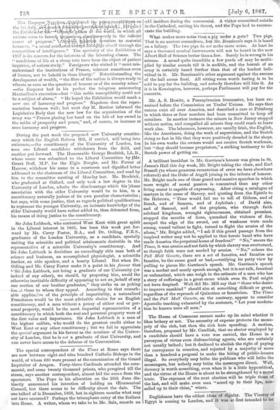The Emperor Noppleoo Aistributed the prieealo:exhil/itgra on the Is:, J,sli,
a'nZinarlet knlekilititretietiott;;?ieEtcli.:. fi:4 (jailed the Exhibit;cirg igt- diiititdegithes of the world, in which all nations seem to launch titemselyet.simultaneou.sly in the infinite career of progress." 1.:Asn'idp-. firiitrcit devotion to material interests, "a moral sentimeninivOttyl disengage sitself through the competition of intelligence." The specialty of the Exhibition of 1867 is its concern for the interests of the labouring classes. The " conditions of life at a cheap rate have been the object of patient inquiries, of serious study." Foreigners who visited it "must mis- understand the institutions of France, tolerant sometimes even of licence, not to behold in them liberty." Notwithstanding the development of wealth, "the fibre of the nation is always ready to vibrate as soon as the question of honour or of the country arises" —the Emperor had in his pocket the telegram announcing Maximilian's execution—but "this noble susceptibility could not be a subject of alarm." " He hoped the Exhibition would mark a new era of harmony and progress." Napoleon does the repre- sentation business well ; but next day M. Rouher informed the Legislative Body that the new law for the organization of the army was " France placing her hand on the hilt of her sword in the midst of prosperity and peace," and, of course, to increase at once harmony and progress.






























 Previous page
Previous page